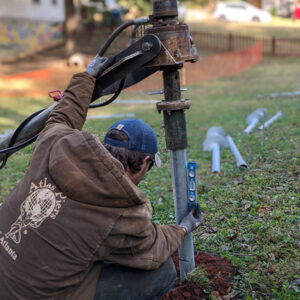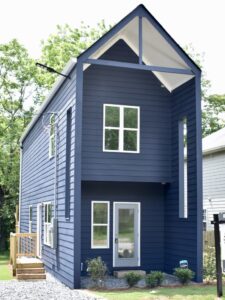Building Wealth and Affordable Housing
View more stories from our 2020 Annual Report
An affordable home in a healthy neighborhood is fundamental to safety, stability and opportunity. Community Development Financial Institutions like Reinvestment Fund play a vital role in supporting residential development that is affordable and responsive to the needs of the local community.
 While we continue to be active in financing large structured housing projects, investments that may be smaller and led by early stage or nonprofit developers can play an outsized role in boosting local economies and increasing the inventory of available affordable housing. Many of our partners in this work develop housing in established communities, using infill strategies that build new construction on vacant lots or modify existing structures.
While we continue to be active in financing large structured housing projects, investments that may be smaller and led by early stage or nonprofit developers can play an outsized role in boosting local economies and increasing the inventory of available affordable housing. Many of our partners in this work develop housing in established communities, using infill strategies that build new construction on vacant lots or modify existing structures.
Reinvestment Fund’s approach to this work has been as an advisor and collaborator. Leveraging our 35+ years of experience in affordable housing finance, we are using our capital to help small scale and nonprofit developers in this sector grow. In 2020, Reinvestment Fund provided $11.5 million to small scale developers, supporting 13 projects aimed at increasing affordable housing.
In times of economic uncertainty such as this, capital can be difficult to access as conventional credit sources tighten their requirements. CDFIs like Reinvestment Fund play a critical role as reliable and flexible capital partners, particularly for smaller developers who are most impacted when banks pull back on lending.
In New Jersey and Florida, we are partnering with Community Asset Preservation Corporation (CAPC), a nonprofit developer to bring new construction, affordable homeownership to appreciating markets. Florida is in the midst of significant population and economic growth–it is currently the third most populous state in the country, with the fourth largest economy. Not surprisingly, the growth has increased the demand for housing, putting pressure on prices and accelerating the loss of affordable housing. Our financing to CAPC is a multi-year, revolving line of credit.
“Financing from Reinvestment Fund has been critical for the development and growth of CAPC’s work,” said Danielle Rosen, CAPC. “Reinvestment Fund’s flexible and dynamic financing has enabled us to continue to work at a high volume while honoring organizational priorities including working with small, minority-owned local general contractors.”
Reinvestment Fund’s financing strategy also aims to help small developers prove out innovative models. For example, Backyard ATL is building affordable housing on land that would not otherwise serve the community. Working to preserve and expand affordable housing in South Atlanta, Backyard ATL is designing and building Accessory Dwelling Units (ADUs) behind the primary residences on single-family lots. The model supports additional density in low to moderate income communities without displacing existing homeowners, allowing existing residents to reap the benefits of neighborhood improvement.
For Backyard ATL developer, Pavan Iyer, the challenge however is trying to solve the paradox of the need for new housing and the fragility of an existing community. “Affordable housing is THE most important cog in the series of parallel running gears that make-up a healthy and equitable social ecosystem. The challenge is and will always be how to create new housing and integrate our housing and story into the existing community so it is of mutual.”
 Another big challenge for affordable housing development in established neighborhoods is existing zoning codes. In Atlanta, Fortas Homes has been working to preserve affordable housing in rapidly appreciating neighborhoods including Pittsburgh, Summerhill, and near Georgia State University. Jim Cheeks, who leads Fortas, explains, “Affordable housing is hindered by decades of exclusionary housing policy which often was performed by our own government. We are constantly advocating for better zoning and learning how to find a road map to get through existing codes. We are forced to push the limits and think outside the box in order to build homes that can offer more density and better options for the customer.”
Another big challenge for affordable housing development in established neighborhoods is existing zoning codes. In Atlanta, Fortas Homes has been working to preserve affordable housing in rapidly appreciating neighborhoods including Pittsburgh, Summerhill, and near Georgia State University. Jim Cheeks, who leads Fortas, explains, “Affordable housing is hindered by decades of exclusionary housing policy which often was performed by our own government. We are constantly advocating for better zoning and learning how to find a road map to get through existing codes. We are forced to push the limits and think outside the box in order to build homes that can offer more density and better options for the customer.”
Controlling costs of development can also be a challenge. These projects are typically on scattered sites and new construction can be expensive compared to large site new development. Changes in the market can affect land cost, labor and much more. Managing costs during the pandemic has been particularly difficult. For example, the cost of lumber alone is up almost 200% from a year ago.
In addition to supporting smaller developers directly through our financing, Reinvestment Fund has also financed investment vehicles such as Jumpstart Philly that works with startup or undercapitalized housing developers.
Learn more about our affordable housing projects.